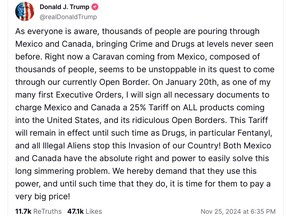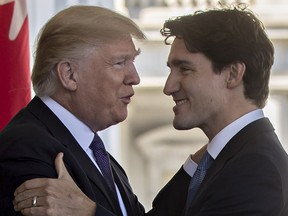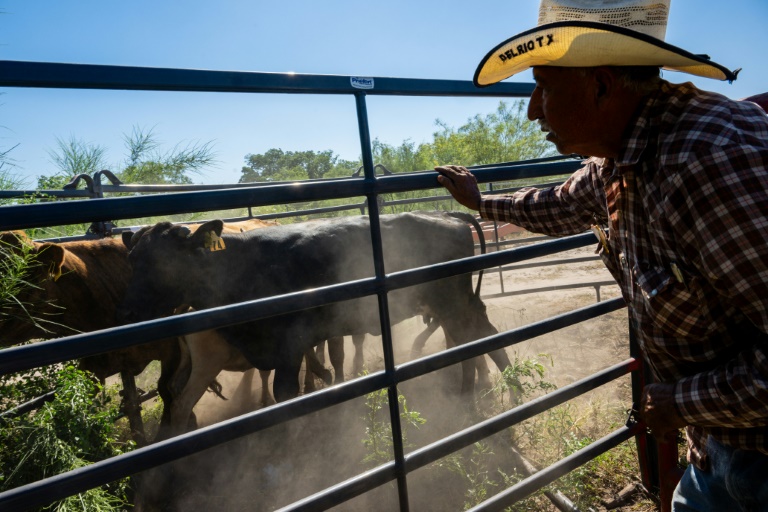Following Trump’s announcement of 25% tariff hike, loonie fell to the lowest level since May 2020
Article content
American president-elect Donald Trump said that he would impose a 25 per cent tariff on all products entering the United States from Canada and Mexico on Monday. The tariff is not in place yet and it has already had repercussions on the Canadian economy. The loonie fell to the lowest level since May 2020, the Canadian Press reported, although the Canadian dollar was already weakening.
Advertisement 2
Article content
Article content
Article content
According to the announcement, made on Trump’s social media platform Truth Social, the tariff would be imposed as of Jan. 20 as one of Trump’s “first Executive Orders,” he said, adding that it “will remain in effect until such time as Drugs, in particular Fentanyl, and all Illegal Aliens stop this Invasion of our Country.”
“Both Mexico and Canada have the absolute right and power to easily solve this long simmering problem. We hereby demand that they use this power, and until such time that they do, it is time for them to pay a very big price,” he said.

Canadian Prime Minister Justin Trudeau said on Tuesday morning that he is set to meet with premiers across the country on Wednesday, per National Post’s Catherine Lévesque, to discuss the topic. Trudeau told reporters while he was on his way to a cabinet meeting that he had a “good call” with Trump the night before.
“We obviously talked about laying out the facts, (talked) about how the intense and effective connections between our two countries flow back and forth. We talked about some of the challenges that we can work on together,” per NP.
Article content
Advertisement 3
Article content
As the discussion surrounding tariffs continues, here’s more about what they are and what Trump’s announcement could mean for Canadians.
What are tariffs and does Canada have them?
Tariffs are “customs duties on merchandise imports,” according to the World Trade Organization (WTO), a global international organization dealing with the rules of trade between nations.
“Tariffs give a price advantage to locally-produced goods over similar goods which are imported, and they raise revenues for governments,” per WTO.
There can be tariffs on animals, plants or other goods.
Yes, Canada does have tariffs.
The tariffs imposed on other countries importing goods into Canada depend on their designation as a Most-Favoured Nation (MFN), General Preferential Tariff (GPT) or Least Developed Country Tariff (LDCT). Other designations include Commonwealth Caribbean Country Tariff (CCCT) and Canada-European Union Tariff (CEUT).
In Canada, a classification system organizes goods into lists and groupings, per the federal government. Goods coming into Canada must have a 10-digit tariff classification number.
Advertisement 4
Article content
Which Canadian sectors could be most impacted by Trump’s tariff hike?
Sectors in Canada that may be most affected by a 25 per cent tariff for products going to the U.S. include cars and car parts, agricultural products, mineral fuels and oils, plastic products, machinery and industrial equipment, and aluminium and steel products, according to Newsweek.
“The United States remains the primary destination for Canadian crude oil, receiving approximately 97 per cent of Canada’s crude oil exports in 2023,” per a report published by the federal government in August. According to a June article in agricultural publication The Western Producer, 75 per cent of Canadian beef was exported to the United States the same year.
Canada and Mexico account for almost 30 per cent of U.S. trade volume, Newsweek reported. The 25 per cent tariff would not only be detrimental for Canadians, but also for Americans, by increasing the cost of products. The tariff could add around $1,000 to $5,000 to the price of a new car, analysts told the publication.
“This action, if pursued, would undermine the principle of the United States-Mexico-Canada Agreement (USMCA), harm businesses on both sides of the border and erode the economic and geopolitical strength of North America,” said Canadian American Business Council CEO Beth Burke in a statement on Tuesday.
Advertisement 5
Article content
“We’ve learned previously that retaliation is inevitable, and countermeasures can target sensitive industries, exacerbating the economic impact and creating uncertainty for businesses. The only way for Canada and the United States to move forward is through dialogue within the framework of the USMCA that President Trump and Prime Minister Trudeau negotiated and signed into force.”
‘We need a Team Canada approach’: How Canadian leaders reacted
Ontario Premier Doug Ford posted on social media that a 25 per cent tariff would be devastating to workers and jobs in both Canada and the U.S.
“The federal government needs to take the situation at our border seriously. We need a Team Canada approach and response—and we need it now,” Ford posted on X last night. “Prime Minister Trudeau must call an urgent meeting with all premiers.”
Advertisement 6
Article content
Quebec Premier Francois Legault tweeted that everything must be done to avoid the tariffs, and British Columbia Premier David Eby posted Trump’s tariffs “would hurt Canadians and Americans alike.”
“Canadians must stand united. Ottawa must respond with strength,” Eby tweeted.
Alberta Premier Danielle Smith said in a social media post that the Trump administration has “valid concerns related to illegal activities” at the border.
But she noted vast majority of her province’s energy exports to the U.S. are “delivered through secure and safe pipelines” which she said “do not in any way contribute to these illegal activities.”
Advertisement 7
Article content
With additional reporting by the Canadian Press
Recommended from Editorial
Our website is the place for the latest breaking news, exclusive scoops, longreads and provocative commentary. Please bookmark nationalpost.com and sign up for our daily newsletter, Posted, here.
Article content








